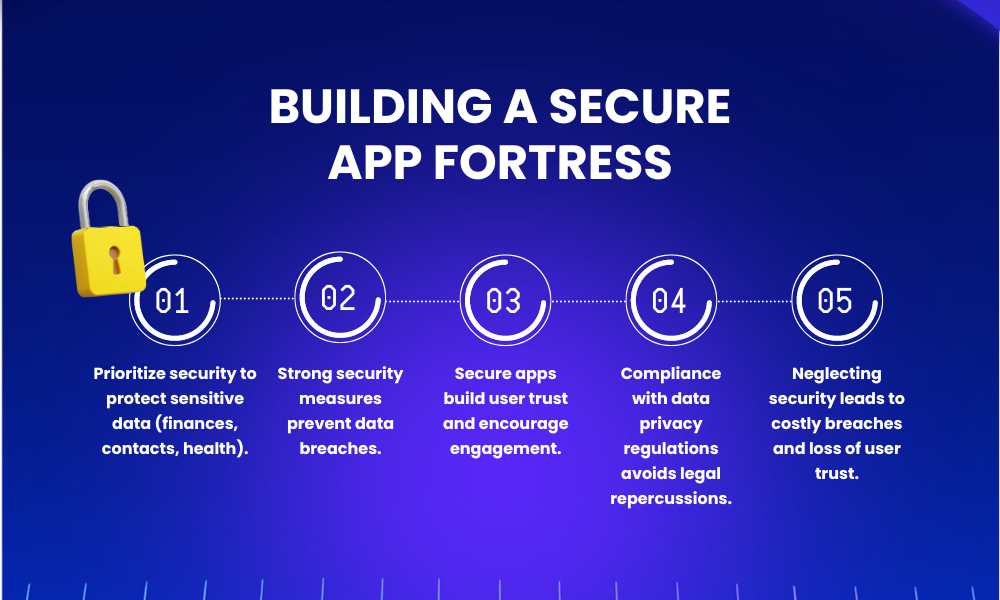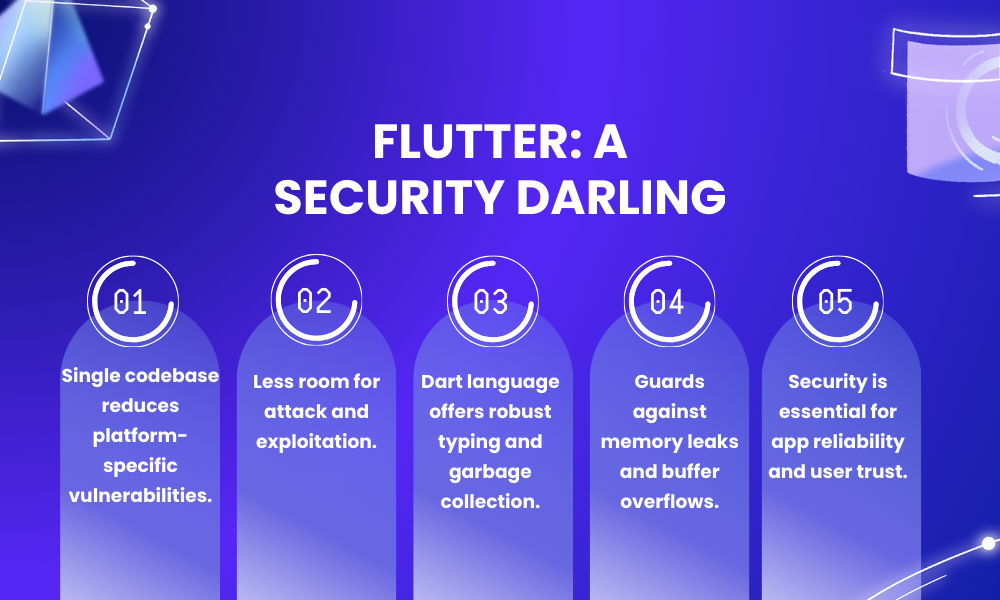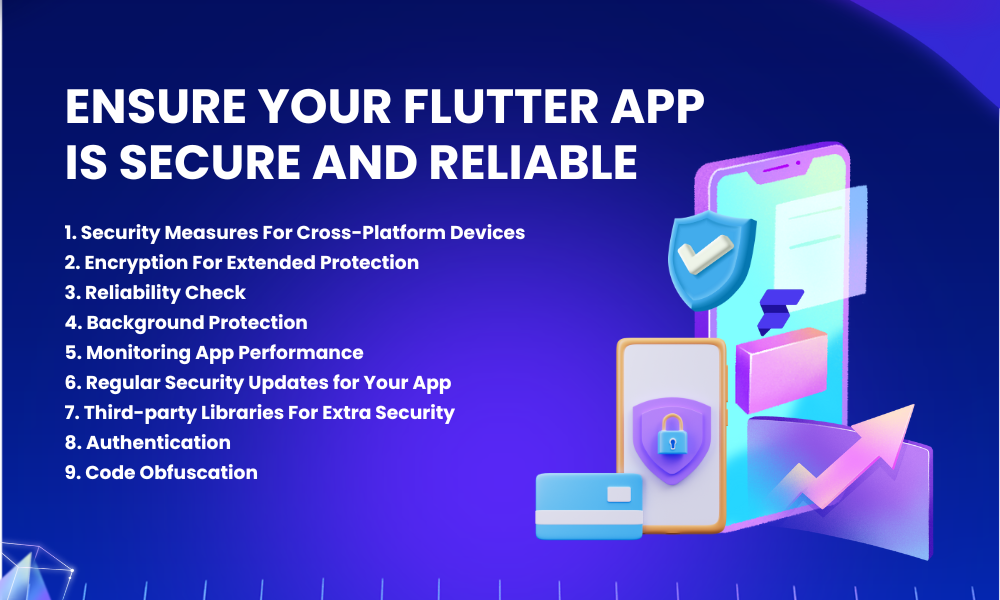In the data driven fast paced era of technology, everything has a security aspect to it that cannot be overlooked. The amount of apps being made today on the Flutter framework might even seem almost insane, but mobile apps comprise most of the game here.
As of recent data, Flutter has totally surpassed other frameworks to become the number one framework to build mobile apps. With about 46% of software developers rooting for Flutter, there is no question about the indispensableness of the Flutter framework. But here’s one aspect that can help you make your apps more reliable: robust security.
Security is one facet in mobile app development that cannot be ignored; and it is also what makes any app stand apart from the rest. Since it garners more trust from the user end, especially for apps that involve storing critical information, any software developer, or mobile apps development agency spends a huge chunk of their time on the security aspect of mobile apps.
Whether you are a freelance software developer, or leverage custom app development services from time to time, this blog will give you a deeper insight into the security side of app development on the Flutter framework.
The Importance Of Building A Secure Fortress Of An App

Security is one of the biggest priorities when developer teams are creating mobile apps. Sensitive information related to many things like finances, contact information, personal health, as well as health issues can be used against users.
Since most apps nowadays store at least one of these types of information, it becomes imperative to set strong guard walls to avoid any data breaches. A strongly secure app also encourages the user to engage more freely with the app. This means that user trust has been earned, and your app can organically bring in more users based on this trust as well.
Secure mobile apps also guarantee compliance with data privacy regulations (depending on regions and countries) as well. If there are, indeed, data breaches because of a lax attitude on the security front of the mobile app, there is bound to be repercussions - at the least, hefty fines to be paid.
Consequences Of Neglecting Security
A security neglect is a foolish play, in any arena, and custom app development services are no exception. Security breaches and data leaks aren’t just headlines anymore, they cost - a lot. According to a study done by IBM last year, the global average cost of a data breach had surmounted up to $4.45 million.
While the numbers definitely are daunting, all of it is accompanied by a loss of user trust. This leads to a belief that users might abandon the app if there are issues related to data and security. This paints a crystal clear picture: that security isn’t just a feature, it is actually a business imperative.
Flutter: A Security Darling

Let's first recognize the security benefits that come with Flutter. Flutter provides a single codebase for various platforms, in contrast to native app development, where vulnerabilities might arise from platform-specific peculiarities (iOS and Android).
As a result, there is less room for assault and less chance of exploitation.
Furthermore, Flutter uses the Dart programming language, renowned for its robust typing system and garbage collection (which ensures clean efficiency).
These features help to guard against memory leaks and buffer overflows, which are frequent security flaws in other languages. No matter how performant your app is across different platforms, if it isn’t secure, it isn’t reliable, and cannot win user trust.
Easy Steps For Ensuring Your Flutter App Is Reliable And Secure

Here are a few ways how you can make sure that your Flutter mobile app is secure, reliable, and isn’t prone to data breaches.
1. Security Measures For Cross-Platform Devices
Certain security measures cannot be used on both iOS and Android devices due to their inherent differences. As a result, it's critical to comprehend how the two differ from one another and concentrate on the specific metrics that will matter most for each platform.
One easy way to go about this would be to include multi platform measures to build a Flutter mobile app. This way, you can recognise and make sure that your mobile app development agency is focusing on the right sensitive points in the app.
2. Encryption For Extended Protection
Mobile app development using Flutter allows encryption of most data that needs to be stored on the app or device. This encryption can take care of two aspects - privacy, as well as data encryption to avoid any kind of breaches.
This enables only authorized users to access the data, as well as prevents any misuse of data by an attacker - because of the encryption.
3. Reliability Check
The new app must be tested in a variety of situations and scenarios to make sure it is as dependable as possible. Testing every codebase, new feature, cross-platform screen reader, debug mode setup, user interface model, etc can guarantee an understanding of how well the app can perform in different scenarios.
This also includes testing for stability and performance in both virtual and real-world settings, in order to find any possible problems or faults before the app is made public.
4. Background Protection
Our ability to access data and information while on the go has greatly improved convenience thanks to mobile devices. However, there is always a possibility of security risks associated with this convenience - such as the possibility that the task -switcher feature might unintentionally divulge confidential data.
Thankfully, developers can address this problem by using the secure_application package in their mobile apps, allowing users to feel secure, knowing that their data is safe, without having to sacrifice the mobile app's usability.
5. Monitoring App Performance
Since Flutter's architecture prioritizes efficiency, developers already know that their apps are performant. But it does make sense to test it for themselves a few times.
Setting up application performance monitoring is a great way to address that. A number of application performance monitoring tools are available to identify any problems or lags that might occur when using the app; this can help to swiftly and effectively identify any issue areas, and tackle them immediately.
6. Regular App Updates With Latest Security Patches
No matter how feature-rich your quick apps are, you still need to update them frequently since things change, just like anything else.
Flutter does give developers this benefit of regular updates with security patches along with bug fixes. To ensure that your Flutter mobile apps are reliable and secure, keep them updated, check for any further issues within the app, and ensure to always check for latest updates as they become available. This is also one way to stay in the game.
7. Third-party Libraries For Extra Security
For developers providing custom mobile app development services using Flutter, third-party libraries are extremely helpful since they frequently aid in accelerating development and enhancing app security.
Flutter apps can benefit from an additional security layer provided by a range of third-party libraries, which range from analytics services to authentication solutions.
However, these third-party libraries also need extra access or permissions for both iOS and Android projects. To ensure that a new library complies with the platform's policies, thorough tests should be done before adding it to the codebase.
8. Authentication
Speaking of security, depending on the kind of app you are building, Flutter mobile apps may need a certain amount of authentication. Tokens and passwords are two of the most used techniques used to guarantee user data security.
While two-factor authentication is the norm in development environments, you might want to think about implementing it for your Flutter application as well. This will enable your potential users to enjoy an additional degree of security to their account before using the app's features.
9. Code Obfuscation
Apparently, humans can reverse engineer anything these days. As for Flutter mobile apps, if your app code is out there in plain text for anyone to read, they can reverse engineer the app codes.
To tackle this, Code obfuscation can be used by developers to disguise codes used in developing the app - by hiding functions and class names in the compiled Dart code!
Conclusion
Today, with all the noise around privacy and security, it is imperative that all apps have a solid layer (maybe two?) of security. The idea behind this isn’t to make developers’ work harder, but to win user trust organically.
While Flutter already has many advantages, security and reliability are some of its strong points too. With the help of tools for app performance monitoring for reliability, data obfuscation, and cross-platform security measures, developers can easily build an app that is solid with both security and absolutely reliable for users.